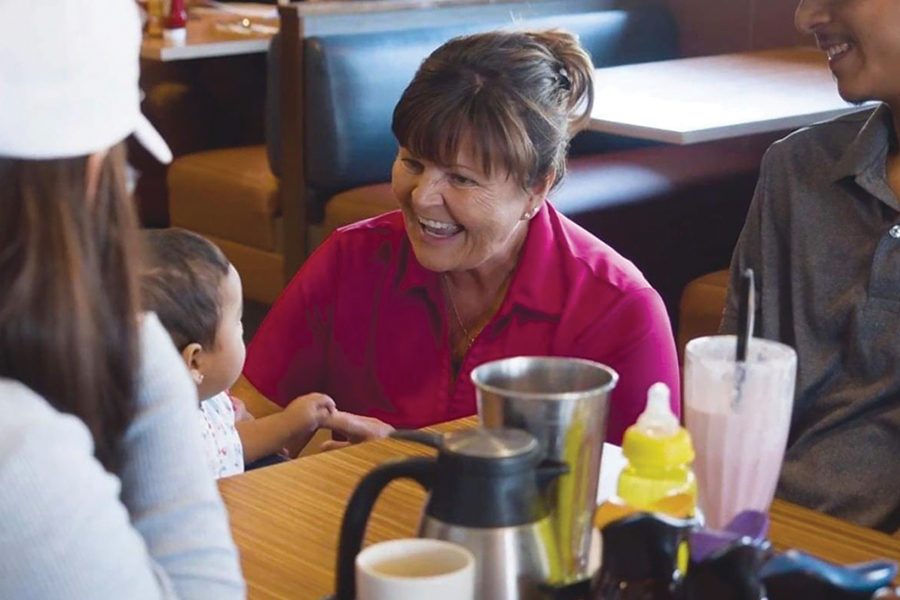
Home » IHOP owner: Locally-owned franchises are local too
IHOP owner: Locally-owned franchises are local too

March 15, 2021
Susan Mendenhall is a fighter.
It doesn’t matter whether it’s a pandemic or trying to educate the public that her two Tri-City IHOP stores are local restaurants.
She won’t lose her fight because after 20 years with IHOP, she still loves and believes in what she does.
She loves the people, whether it’s her employees or her customers.
“There is not an hour that’s ever the same at IHOP,” Mendenhall said. “That keeps it really fresh. I’ve always been a people person. I’ve always been my happiest interacting with the customers.”
Pandemic pain
Still, Mendenhall is not going to lie about this pandemic: this past year has been the hardest one in her career.
“There hasn’t been a day last year where I have had a good night’s sleep,” she said.
Mendenhall and her staff have done what they could to keep things going, even while indoor seating is limited to 50% capacity under Phase 3 of the state’s Roadmap to Recovery rules.
They put up tents. They served up more take-out.
Mendenhall applied for loans and grants.
She received two different federal Paycheck Protection Program, or PPP, loans.
“That PPP loan the first time saved our bacon, no pun intended,” Mendenhall said. “Without that money, we would’ve been done by Jan. 1.”
But the woman who was named IHOP’s Franchisee of the Year in 2018 – among all 1,700 IHOP restaurants worldwide – has a lot of friends and supporters.
“I have a great relationship with the Community First Bank people,” Mendenhall said. “They know my track record. Just today, the vice president of community relations called me to check on me. I mean, who does that? I have to be very blessed.”
That first PPP loan came in April, but she said the business didn’t need it until August.
She received grants from the state, $50,000 from the Tri-City Development Council and $11,000 from Franklin County.
“Another grant we’re eligible for is from the Washington State Department of Commerce,” she said. “So we’ve gotten some help there. Once you do one of them, they’re easy. Because almost all of them ask for the same information. There are many of them out there. I don’t know why more businesses don’t try to get them.”
Getting into IHOP
Mendenhall worked 15 years for the McDonald’s Corp. before running her own day care business starting in 1992.
That lasted for nine years when her brother-in-law approached her in 2001.
“Randy Mendenhall had his company, Heritage Landscaping, doing work at the Kennewick store, when he found out it was for sale,” she said.
He made her an offer: “I’ll buy it, you run it for me. And when you’re ready, you can buy it from me.”
After four years, he was ready to sell it to her. But Susan, who knew the day-to-day operations of the restaurant, felt she wasn’t ready.
“I was not confident,” she said. “So Randy said, ‘Then let’s build a second one in Pasco, and you can learn the financial side of the restaurant.’ ”
That was in 2005.
Susan finally made the move in 2010.
Winning national kudos
Susan doesn’t like to toot her own horn. She has to be prodded and research has to be done.
“We’ve been consistently A-rated,” she finally admitted. “I’m involved with my restaurants. A lot of franchisees don’t ever set foot in theirs. We test items for IHOP and whether they should be put on the menus (for the entire company).”
Currently, the Kennewick restaurant is piloting a new point-of-sale system that could be used company-wide.
“And our sales have consistently gone up over the years,” she said.
The restaurants also like to help the community when they can.
In 2015, a large group of California firefighters were on their way to north central Washington to fight fires when they stopped to eat in Kennewick.
Susan and her staff comped their meals.
“The standing rule we have is that any time there is a natural disaster, with first responders, we typically give them a free meal,” she said. “We give back when we can.”
That means donating meals to the local mission. Or during this pandemic, feeding first responders in local hospitals, clinics and medical centers.
Battling the pandemic
With a limited amount of indoor seating or no indoor seating at all, Susan and her daughter Lauren Jones – who serves as district manager for both stores – have had to get creative.
Of course, there has been takeout orders, but it’s still been a challenge.
“We opened at 25% (capacity) last year,” Susan said. “In November we got busier, hired more people, trained them. We were open for two weeks, then they shut us down again. We spent thousands of dollars training those people. We can’t keep shutting down.”
And there have been the tents – first in the summertime, then this past winter.
“Anybody wants to learn about tents, my husband Russ can give a class,” Susan said. “We learned a lot. The wind blew one over. A snow load caved another one in.”
In the winter, heaters were added, but Susan said she had one rule.
“If we couldn’t get that tent up to 60 degrees, we couldn’t do it. Not if you have a plate of eggs to take out there. They had to be warm,” she said.
It appears the tents are coming back as spring arrives.
“I don’t know if we’ll ever get back to 100% indoor dining,” she said.
Mendenhall, with the help of her Pasco landlord, added an outdoor patio with the idea it can be used throughout the year.
“We hope to get something similar at the Kennewick store,” she said.
The tents, though, were a godsend.
“When things got shut down, the calls would not stop. People were wanting to eat,” she said. “We thought, ‘We could do this. Let’s take a chance.’ It carried us through the dark months.”
Employees who were laid off called Susan and Jones.
“They were saying, ‘I need to come back to work. I’m tired of being home,’ ” said Susan, who praised her employees who faced down the pandemic beside her. “My staff did such a good job. We have a phenomenal staff. We tried to keep most of the full-time staff when we did have to do layoffs.”
Which brings us to her next problem: not enough staff.
“Now we have the opposite problem in that we can’t find enough people to work,” Susan said. “And we’re getting busier and busier.”
There are a combined 70 employees at both the Kennewick and Pasco stores.
“And both stores could each use another 10 to 15 more employees,” Susan said. “I mean, we can’t stay open later because we just don’t have the people.”
Currently, hours of operation at both stores are 7 a.m. to 4 p.m. seven days a week. Before the pandemic, they were open until 9 p.m.
A PR problem and the future
In a time when people promote spending their money at local stores and restaurants, Mendenhall has to remind them that their restaurants are local too.
“Yes, it’s a franchise, but it’s still local,” she said. “We fight it every day. People say, ‘Shop small or local.’ I tell them, ‘Hey, I’m a business owner. I have local people working in this store. I’m the one that’s carrying all of the risk.’ ”
And that includes eventually adding another store.
“Right up until the pandemic, I got a bit of pressure from IHOP to build more stores,” Susan said.
But there are not enough people yet in the Tri-Cities to build a third store, according to IHOP.
“But they talked me into going to Yakima,” she said.
Just before she was to pull the trigger, she got cold feet and backed out. Not much longer after that, the pandemic hit.
“My husband, who was mad at me when I was going to build in Yakima, thought I was a genius,” she said.
Maybe someday it will happen. And when it does, she hopes the local IHOP restaurants stay in the family business. Susan wants to eventually turn it all over to Jones, with the hope that she would someday turn it over to her kids.
Susan said she’s survived thanks to the support from her loyal customers and employees.
“I can’t take a lot of credit on this,” said Susan of her company’s success over the years. “The Tri-Cities has supported us so much, especially during this pandemic. Financially, we’re OK. We’re not making any money, but we’re close to breaking even.”
Business Profiles Local News
KEYWORDS march 2021




